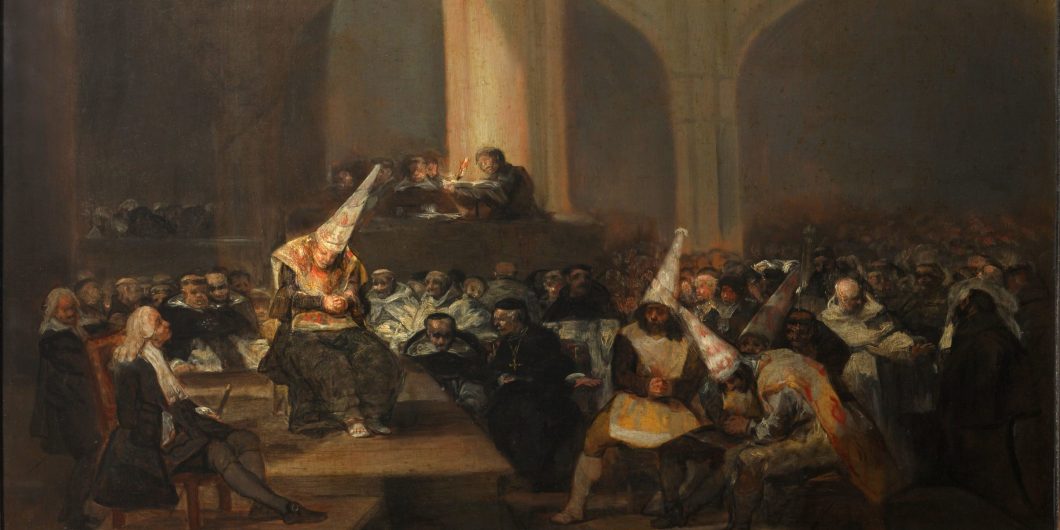Racism is truly opposed not by anti-racists, but by non-racists, that is, people who do not judge or behave towards others according to their race.
The Grand Inquisitor and the Voice of Freedom
Sermonising novels are the flaw of authors with an ulterior motive: they disregard the winding path of spiritual growth, ignore the complexities of each person’s character, and miss the potential for sudden failures and unexpected comebacks. Instead of capturing the inner emotions of the protagonist, the moralistic writer merely makes a general statement and engages in covert propaganda. Dostoevsky’s writing resists this temptation. He delves beyond the superficial societal realities to reveal the intricate, non-linear, and often conflicting depths of the human soul.
The rich philosophical vision of Fyodor Dostoevsky is punctuated, in his masterpiece The Brothers Karamazov, by a dynamic narrative full of psychological realism, highlighted by complex characters. Even a virtuous character like Alyosha has his own weaknesses—he is tempted by Rakitin’s offer of vodka and sausages and experiences a certain disturbance upon encountering the alluring Grushenka. Still, the main protagonist is looking to retrieve Paradise Lost. His guide to heaven is not the famous poet Virgil, but an anonymous monk, Zosima. The master passes on not just a set of values, but that practical wisdom, which allows one to embrace the suffering of innocent children and still resist the temptation of atheism. At the end of the novel, acting in the name of the universal priesthood granted through baptism, Alyosha celebrates a cosmic liturgy in which both humans and the elements of nature freely participate, celebrating the victory of life over death and joy over sorrow.
Alyosha’s special calling is therapeutic, not political or ideological. Zosima has sent his disciple into the world in order to heal first the wounds of his two brothers’ souls.
The older Dimitri is depicted as a passionate and impulsive person with a weak spot for female beauty, who protests against his father’s authority because of the love triangle between his father, himself, and the woman they both desire, Grushenka. His impulsive and jealous nature, combined with his father’s lascivious behavior, creates a complicated and intense scenario fueled by frustration, hatred, and jealousy. This ultimately leads to the murder of the father, with Dimitri being the only one accused.
Ivan’s intellectualism compels him to reject the existence of God and the afterlife. His arguments are based on the lack of justice in the world, and his refusal to accept a deity who allows suffering to flourish. Despite his academic education, Ivan’s detachment from spirituality and emotions makes him incapable of experiencing true human connection and empathy, causing him to struggle with his own humanity.
Aloof and sarcastic, Ivan looks down upon all the monks and clerics of the Orthodox Church, due to their lack of conceptual rigor. Just like Spinoza and Voltaire, Ivan seems to think that mystical theology or biblical hermeneutics are not fully prepared to face criticism from modern philosophers. But Alyosha still surprises his brother with his ability to listen to even the wildest confessions of an atheist philosopher.
With infinite patience and a loving demeanor, the younger brother doesn’t display the rigid, inflexible mindset of official theologians. This is why he accepts Ivan’s invitation to visit the “Metropol” restaurant (or, more aptly, the pub), where Ivan opens up about his anxieties, failures, and disappointments. He expresses his despair over the evil in the world, where blameless people suffer and their cries for help go unanswered. He questions why God allows abusive and drunken parents to hurt their offspring’s psyche to the point of exhaustion, even making the practice of bullying a “national sport.”
The Grand Inquisitor
Ivan then describes an event that presumably took place in Seville during the sixteenth century, at the height of the Inquisition. Despite the daily abuses made by the Catholic Church in the name of God’s love for humankind, Jesus chose this very moment to descend among His people, in the very place where the pyres burned some of the intractable heretics. By order of the cardinal, he is arrested and imprisoned.
The cardinal is an old man of almost ninety years old, dressed in a coarse monk’s robe, and speaks to Jesus from the position of an omniscient being who truly understands the psychology of crowds. He believes that his duty is to create a system of control, propaganda, and agitation to exercise his power beyond any constitutional limits. The cardinal knows that humans are always tempted to abandon the fragile freedom offered by God to Adam as an undeserved gift in exchange for the security and comfort promised by the serpent.
The Spanish Inquisition represents the institutionalization of this perennial temptation, whereby people voluntarily surrender their real freedoms for the delusional benefits of being protected by the state. Dostoevsky is warning against the dangers of giving up one’s individual sense of freedom for the sake of social acceptance and physical security, as this can lead to the loss of one’s human dignity and the enslavement of people.
The cardinal speaks from the perspective of the holder of secret knowledge. Any system designed to exploit the ignorance of the masses will resort to experts who, in the name of objective science, can justify any economic, educational, or medical policies. He is an “all-knowing” intellectual who is willing at any time to replace the ill-informed choices of the uneducated people with his own enlightened orders or executive decisions.
The Grand Inquisitor refuses any local initiative and instead maintains a religion of fear, based on control and surveillance, an absence of privacy, and a tight grip on society. There are no checks and balances, which could prevent the Cardinal from abusing his nearly absolute powers.
Here we discover the demonic configuration of the authority of the Grand Inquisitor, eager to oversee the destinies of the masses, crush all dreams, and diminish the infinite potential of human nature. The devilish spirit puts freedom in the service of nothing. The demands of Christian life prove to be intolerable.
Millions of citizens have lined up, from the French Revolution to this day, to pursue universal happiness at the expense of individual freedom; the worship of supreme authority instead of the ethics of personal courage; class hatred instead of neighborly love.
If so, Jesus was wrong in rejecting the devil’s first temptation in the wilderness. The hunger for the sacred and the search for celestial bread might be a misguided effort. Happiness goes through the stomach, says the Grand Inquisitor. This suggests that a significant minority of saints, geniuses, and heroes who have sacrificed themselves throughout history for a noble cause remains irrelevant. It is not coincidental that the people who were misled by the false prophets of modern utopias have crucified their spiritual elites, guilty of believing in an ideal such as truth, family, homeland, or God.
The Grand Inquisitor accuses Jesus of a lack of intelligence when it comes to the promises of power (“the domination of the world and Caesar’s purple”). The pleasure of presiding, dominating the other, and crushing dissent are just some of the classic ingredients of totalitarianism. But instead of fear, the Son of God preached pure and impartial love, whereas the Grand Inquisitor wanted something else: the obscene adulation of the mobs, the cheers of the crowds, and the paralyzing fear of servants who grovel at their masters as benefactors.
Ivan’s tirade appears to be, at first, a merciless accusation against God, but ends with a harsh denial and ultimate degradation of human dignity. The cardinal not only scolds Jesus but humiliates the creature for whom God became incarnate. Ivan Karamazov flirts, therefore, with philosophical theories that suggest that the entire world is nothing but the result of a cosmic accident or a faulty production line. The only solution for “correcting” things is totalitarian-style education.
Totalitarianism
How can this submission be obtained? Through micro-management. No educational enterprise or religious act should be spontaneous, and any individual decision needs to be preceded by careful calculation.
The response of Jesus after the eloquent speech of the old cardinal is a kiss. Despite the old man’s desire to hear Jesus’ voice, the Saviour approaches him in complete silence. A silent kiss is Jesus’ only response. The inquisitor shudders and then heads towards the door, opens it, and says: “Go and never come back … never, never!”
The high priest lets Jesus leave “into the night that envelops the city square.” The prisoner then departs. This story portrays the second trial of Jesus Christ, meant to reveal the contrast between the authenticity of a human being and the duplicity of power institutions. Numerous philosophers and exegetes of the Grand Inquisitor story, from Vasily Rozanov and Sergei Bulgakov to Nikolai Berdyaev, Joseph Frank, and Rowan Williams, have highlighted the timeless tension between freedom and obedience, between truth and lies, between individual responsibility and hysterical collectivism, between risk and safety, between heart and gut, between courage and cowardice, between transparency and secretiveness.
Dostoevsky sought not only to incriminate the pathologies of a medieval theological project transformed into a mental prison, but also to reveal the superstitions of utilitarian-atheistic modernity. In the context of the revolutionary proclamation of “the death of God,” the Russian prophet anticipated the coagulating force of ideological falsehood. “They will pull down the temples and inundate the earth in waves of blood. … Every word of theirs will be a word of slander.”
Millions of citizens have lined up, from the French Revolution to this day, to pursue universal happiness at the expense of individual freedom; the worship of supreme authority instead of the ethics of personal courage; class hatred instead of neighborly love; the myth of historical progress instead of the traditional wisdom grounded in what really works. As the Grand Inquisitor said, “Even when all the gods disappear from the face of the earth, people will still kneel in front of the idols.”
Communism and fascism were mass movements that replaced traditional Christianity as secular religions worshipping the earthly powers rather than the heavenly King and Comforter. Throughout the twentieth century, the history of totalitarianism was inseparable from the practice of censorship, public shaming, mock trials, and terror mounted against all dissident voices. The Grand Inquisitor claimed to be an infallible leader in charge of the administrative state and of the police infrastructure.
The historians of modernity may notice that, after Seville, the Grand Inquisitor moved his headquarters to Paris (1789), to Petersburg (1917), then to Moscow (1918), and later to Berlin (1933), Bucharest (1946), Beijing (1949), and Havana (1953). From the Andalusian burnings on the rug, totalitarian gnosis reached Russia under Stalin’s great terror, Hitler’s Germany, Maoist China, malnourished and hyper-militarized North Korea, revolutionary Cuba, or Ceaușescu’s Romania.
The twentieth century saw entire peoples ruined by voluntary servitude and collapsed at the feet of tyrants. “Food for everyone” became, thanks to socialism, widespread famine (especially in Ukraine, during the Holodomor); the pursuit of the historical dialectics became moral blindness and sheer cruelty; the struggle for emancipation became regression towards animality.
Looking for extraordinary things in their very ordinary lives, people always seek a miracle—the empirical demonstration of the omnipotence of a scientific principle, an artistic idol, a political sovereign, or a deity. Jesus did not tempt God to prove his omnipotence and did not throw himself from a height to “test” the faithfulness of the angels. But superficial individuals appreciate such a trick. The popularity of soothsayers and clairvoyants throughout time, as well as the ecstasy of drugs and the thrill of technological magic, all show our weakness for “miracles.” Well-fed, we want to be entertained. By contrast, faith is the opening of the soul to the reality of death, a free act of disciplined will, a sustained effort of moral imagination, a difficult journey to the promised land, and a spiritual path incompatible with the reflex of manipulation.
An innate idealist, F. M. Dostoevsky attacked the centralized philosophy of all political systems that deny individual sovereignty and the principle of subsidiarity. The legend of the Grand Inquisitor is, above all, a story about the perennial value of freedom against any dogma of infallibility of perverse social engineering. It was a tale relevant in the nineteenth century and even more so today.


